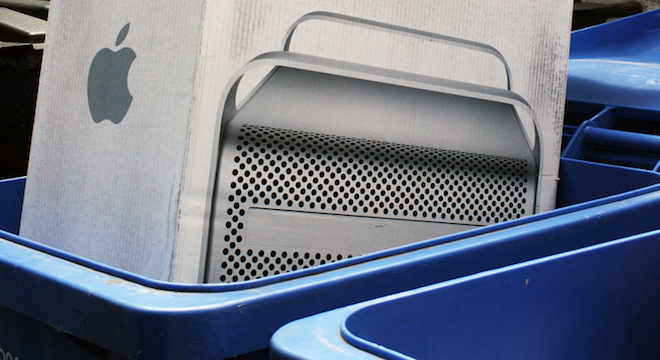The status of Apple’s on-again, off-again relationship with an eco-friendly products association is anything but resolved.
Apple confirmed in early July that it would be leaving the Electronic Product Environmental Assessment Tool (EPEAT), an organization dedicated to reviewing the sustainability of various electronic devices, only to face enormous backlash from high-profile consumers such as the city government of San Francisco, who threatened to block purchases of Apple products as a consequence.
Acknowledging overwhelming customer opposition to the move and admitting it was a “mistake,” Apple returned to EPEAT a week later, re-listing its 40 different products, only to rate one of its own product lines, the new Macbook Pro Retina display laptop, as a Gold product, the highest EPEAT certification for sustainability, despite the fact that the product contains glued-in batteries, which EPEAT said made it prohibitively difficult to recycle. Environmental advocates called Apple out for what they viewed as “greenwashing,” its products.
But now EPEAT has clarified that it will be closely scrutinizing all of Apple’s new products and will make a determination within weeks, likely by mid-August, on whether they are allowed to keep the ratings Apple has given them.
Apple “can still be out of compliance,” said Sarah O’Brien, EPEAT’s communications director, in a phone interview with TPM.
“They can be completely taken out of the system,” O’Brien continued. “That’s happened very rarely. I don’t think it’s ever happened with a larger player, but it’s always theoretically possible for a product, if it doesn’t meet criterion, to disappear from the EPEAT system.”
A more probable outcome is that Apple could see the Macbook Pro Retina models reduced from a Gold rating to a lesser but still compliant one, Silver or Bronze.
Most likely, though, is that EPEAT will change its own standards in such a way that will accomodate Apple’s glued-in batteries and allow the Macbook Pro Retina latptops to keep their ratings, though EPEAT maintains that any changes would not be due to Apple’s influence.
“We subject them and all other companies to the same processes,” O’Brien told TPM.
O’Brien also cautioned that EPEAT wasn’t just responding to the concerns of environmental advocates that make up its numerous stakeholder groups, such as environmental advocacy group the Electronics TakeBack Coalition (ETBC), which was the first to point out that Apple had re-listed the Macbook Pro Retina Display as a “Gold” EPEAT product, the highest rating for eco-friendliness, despite the fact that Apple made no visible change to its glued-in battery.
“They have a perspective,” said O’Brien in reference to the ETBC, “But we have over 400 people and groups that talk to us and many many perspectives.”
While O’Brien said that EPEAT would consider the criticisms and concerns raised by its stakeholders, the organization is relying primarily on technical data in its review of the Apple products, such as what materials the company uses in its adhesives and what processes it promotes for recycling or repair.
But at the same time, EPEAT is clearly backing away from earlier statements made by its CEO Robert Frisbee to The Wall Street Journal when Apple first left EPEAT that the Macbook Pro Retina’s glued-in batteries were at the crux of its decision to leave EPEAT.
“If the battery is glued to the case it means you can’t recycle the case and you can’t recycle the battery,” Frisbee told The Wall Street Journal at the time.
Now EPEAT’s O’Brien says that the glued-in battery may be ecologically friendly according to EPEAT after all, if Apple has an easy and effective means of dismantling products that use it.
“It doesn’t say in the EPEAT standard that a product ‘cannot be glued,'” O’Brien told TPM. “It just says that it has to be easy to take apart. Maybe there are technologies and methods that make glued-in devices easy to take apart that we previously weren’t aware of. When we investigate it, they have to conclusively demonstrate to us that it is easy.”
O’Brien further explained that the basic standard by which EPEAT grades products, called IEEE 1680.1, was first developed along with EPEAT itself in 2003 and 2004, before many technological advances in product design, assembly and disassembly.
Even a 2009 update of the standard doesn’t take into account the latest advances, O’Brien said. As such, EPEAT has been independently reviewing that standard and coming up with a more comprehensive update, which it has been working on since “last summer,” according to O’Brien.
Asked whether EPEAT could be viewed as kowtowing to Apple in changing its standards, possibly to include glued-in batteries, though no final determination has yet been made, O’Brien adamantly asserted that EPEAT was not doing such a thing.
“We don’t take this lightly,” said O’Brien. “We do understand in this instance, there’s a lot of suspicion simmering out there and we need to be very explicit with our findings. We always publish verification and non-compliance, but we want to be very upfront and clear about our reasoning.”
Apple did not respond to inquiries in time for the original publication of this report.






